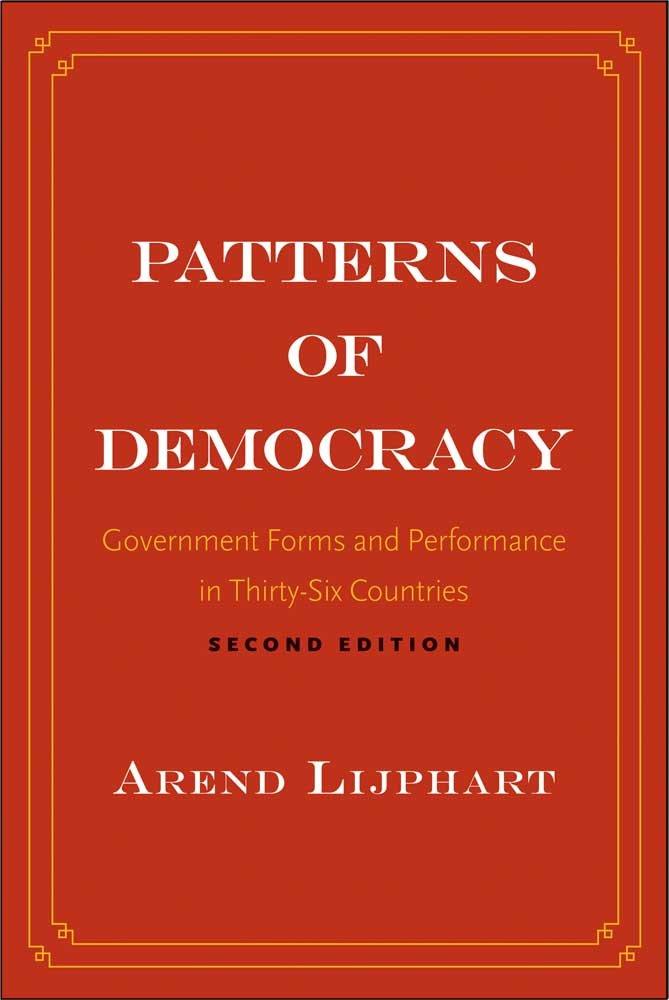Patterns of Democracy: Government Forms and Performance in Thirty-Six Countries

This expanded and updated edition offers an unparalleled deep dive into the mechanics of democratic institutions across the globe. By meticulously examining thirty-six democracies from 1945 to 2010, the author provides readers with fresh, unexpected insights into what makes a democracy function effectively. The result is a thought-provoking, data-rich analysis that shines a light on patterns and variations previously overlooked, making it an indispensable resource for anyone interested in political science or governance. ThePrevious praise highlights its groundbreaking research and clear,compelling writing style,ensuring it remains a staple in academic discussions and beyond.
What sets this work apart is its meticulous compilation of data and its ability to distill complex political phenomena into accessible, actionable conclusions. Readers will gain a deeper understanding of how diffrent democratic systems compare and contrast, and why certain structures outperform others in stability and responsiveness. Whether for students, scholars, or policyakers, this book is a treasure trove of analytical rigor and practical wisdom, blending ancient context with cutting-edge research to offer a window into the future of democratic governance.
| Pages | 368 |
|---|---|
| publication Date | September 11, 2012 |
| Format | Paperback |
| Weight | 14.7 ounces |
A Dialogue on the Best Form of Government

This item stands as a testament to the enduring value of cultural heritage, having been meticulously selected by scholars for its profound importance in shaping modern civilization. As a direct reproduction from the original artifact, it preserves the authenticity of the work, complete with original copyright references, library stamps, and other historical notations that tell a story of its journey through some of the world's most prestigious institutions. In the United States,this work resides in the public domain,allowing for unrestricted copying and sharing—ensuring that its knowledge remains freely accessible to everyone.
While bound to contain the imperfections of age, such as missing or blurred pages, or minor markings, these flaws are celebrated as part of its historical character.Scholars and publishers agree that preserving and making such works available is a labor of great significance, bridging the gap between the past and present. Your support in this endeavor helps keep this invaluable knowledge alive, ensuring it continues to inspire and educate for generations to come.
Pros
- Authentic reproduction of a culturally significant work
- Unrestricted access in the public domain (USA & possibly other nations)
- Free to copy and distribute
- Preserves original annotations, stamps, and page markings
Cons
- MAY contain missing or blurred pages
- May have physical imperfections like errant marks
| Details | Information |
|---|---|
| Publisher | Wentworth Press |
| Publication Date | March 5, 2019 |
| Pages | 128 |
| Weight | 12.6 ounces |
LEARN THAT DEMOCRACY IS THE BEST FORM OF GOVERNMENT. LEARN ABOUT THE DISADVANTAGES OF COMMUNISM. A PUBLIC ADMINISTRATION BOOK

Discover the foundational principles of effective governance with this concise guide, designed to illuminate the strengths of democratic systems while offering a balanced perspective on the challenges posed by option structures. Ideal for students or anyone seeking a clear, accessible introduction to political science, this resource distills complex ideas into digestible insights, enhancing understanding without overwhelming detail. The streamlined format, featuring enhanced readability features like text-to-speech and adjustable fonts, ensures a seamless learning experience whether you're reading on the go or settling in for a focused study session.
Dive into the practical applications of governance theory with this thoughtfully crafted text, which bridges classroom concepts with real-world relevance. The compact design, neatly packaged at under 5.4MB,makes it easy to carry on any digital device,supporting unlimited simultaneous use across all your preferred platforms. Supported by assistive technologies like screen readers and word-wise integration for smoother comprehension, this guide offers a flexible learning solution that adapts to your individual needs, empowering you to engage critically with key political ideologies.
| Specification | Details |
|---|---|
| Format | Digital guide |
| Size | 5.4 MB |
| Pages | 13 |
| Publication | May 23, 2023 |
Democracy for realists: Why Elections Do Not Produce Responsive Government (Princeton Studies in Political Behavior)

In a world where the ideal of an informed citizenry guiding policy is often taken for granted, this book offers a startling, evidence-based reality check. It explores how democratic processes are frequently driven by social identities and partisan loyalties rather than reasoned policy debate, revealing the unexpected ways voters shape—and sometimes misunderstand—public decisions. With rigorous analysis and unexpected examples, readers gain a clearer picture of how democracy truly operates, challenging assumptions and opening doors to more effective political engagement.
Far from being a call to despair, this work serves as a foundational tool for understanding the dynamics of modern democracy. By grounding theory in observable human behavior, it provides practical insights for anyone seeking to navigate or improve the political landscape. Whether for students, policymakers, or simply curious citizens, the book’s fresh perspective and new analysis, including post-2016 election insights, make it an essential read for anyone looking to grasp the real forces at play in the halls of power.
Pros and Cons
- Pros: Groundbreaking insights into voter behavior
- Pros: Offers actionable alternatives to traditional democracy theories
- Pros: Supported by extensive social-scientific evidence
- Cons: May challenge deeply held beliefs about democracy
- Cons: Some sections may require a background in political science
| Paperback | Pages | Dimensions |
|---|---|---|
| 424 | 6 x 1 x 8 inches | 12.5 ounces |
Transform Your World
Conclusion:
Democracy, as explored through comparative analysis, reveals both its enduring strengths and unexpected shortcomings. While established frameworks suggest a rational, issue-driven citizenry, empirical insights paint a more nuanced picture—highlighting the influence of identity, partisanship, and chance. This balanced perspective encourages a more realistic engagement with democracy, fostering both critical reflection and renewed commitment to its potential for progress.
### Card 1:

Democracy for Realists: Why Elections Do Not Produce Responsive Government (Princeton Studies in Political Behavior)
"Voters mostly choose parties and candidates on social identities, not issues—revealing the gap between idealized democracy and reality."
- Pros:
- Cons:

